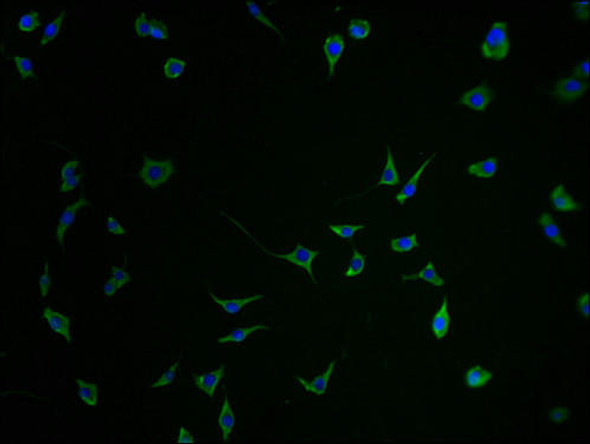Description
IPMK Antibody (PACO00979)
The IPMK Polyclonal Antibody (PACO00979) is a valuable tool for researchers studying IPMK, an essential enzyme involved in the regulation of cell metabolism and signaling pathways. This antibody, produced in rabbits, demonstrates high specificity and sensitivity towards IPMK in human samples, making it ideal for use in Western blot applications.IPMK, also known as inositol polyphosphate multikinase, plays a crucial role in cellular processes such as cell growth, survival, and differentiation. By targeting IPMK, researchers can gain insights into various biological processes and potentially uncover new therapeutic targets for diseases such as cancer, diabetes, and neurological disorders.
The IPMK Polyclonal Antibody is a reliable tool for analyzing the expression and activity of IPMK in different cell types and tissues, providing valuable information for studies in cell signaling, metabolism, and disease mechanisms. Invest in this antibody to enhance your research efforts and further explore the functions of IPMK in cellular physiology and pathophysiology.
| Antibody Name: | IPMK Antibody |
| Antibody SKU: | PACO00979 |
| Size: | 50ug |
| Host Species: | Rabbit |
| Tested Applications: | ELISA, WB, IHC |
| Recommended Dilutions: | WB:1:500-1:2000, IHC:1:100-1:300 |
| Species Reactivity: | Human, Mouse, Rat, Monkey |
| Immunogen: | synthesized peptide derived from the C-terminal region of human IPMK. |
| Form: | Liquid |
| Storage Buffer: | Liquid in PBS containing 50% glycerol, 0.5% BSA and 0.02% sodium azide. |
| Purification Method: | The antibody was affinity-purified from rabbit antiserum by affinity-chromatography using epitope-specific immunogen. |
| Clonality: | Polyclonal |
| Isotype: | IgG |
| Conjugate: | Non-conjugated |
| Synonyms: | IPMK; IMPK; Inositol polyphosphate multikinase; Inositol 1; 3,4,6-tetrakisphosphate 5-kinase |
| UniProt Protein Function: | IPMK: Inositol phosphate kinase with a broad substrate specificity. Has a preference for inositol 1,4,5-trisphosphate (Ins(1,4,5)P3) and inositol 1,3,4,6-tetrakisphosphate (Ins(1,3,4,6)P4). Belongs to the inositol phosphokinase (IPK) family. |
| UniProt Protein Details: | Protein type:Carbohydrate Metabolism - inositol phosphate; EC 2.7.1.151; Kinase, other; Motility/polarity/chemotaxis Chromosomal Location of Human Ortholog: 10q21.1 Cellular Component: nucleolus; nucleoplasm; nucleus Molecular Function:ATP binding; inositol tetrakisphosphate 3-kinase activity; inositol trisphosphate 3-kinase activity; inositol trisphosphate 6-kinase activity Biological Process: inositol phosphate biosynthetic process; inositol phosphate metabolic process; neural tube formation; phosphorylation |
| NCBI Summary: | This gene encodes a member of the inositol phosphokinase family. The encoded protein has 3-kinase, 5-kinase and 6-kinase activities on phosphorylated inositol substrates. The encoded protein plays an important role in the biosynthesis of inositol 1,3,4,5,6-pentakisphosphate, and has a preferred 5-kinase activity. This gene may play a role in nuclear mRNA export. Pseudogenes of this gene are located on the long arm of chromosome 13 and the short arm of chromosome 19. [provided by RefSeq, Dec 2010] |
| UniProt Code: | Q8NFU5 |
| NCBI GenInfo Identifier: | 50401072 |
| NCBI Gene ID: | 253430 |
| NCBI Accession: | Q8NFU5.1 |
| UniProt Related Accession: | Q8NFU5 |
| Molecular Weight: | 47,222 Da |
| NCBI Full Name: | Inositol polyphosphate multikinase |
| NCBI Synonym Full Names: | inositol polyphosphate multikinase |
| NCBI Official Symbol: | IPMK |
| NCBI Protein Information: | inositol polyphosphate multikinase |
| UniProt Protein Name: | Inositol polyphosphate multikinase |
| UniProt Synonym Protein Names: | Inositol 1,3,4,6-tetrakisphosphate 5-kinase |
| Protein Family: | Inositol polyphosphate multikinase |
| UniProt Gene Name: | IPMK |
| UniProt Entry Name: | IPMK_HUMAN |










